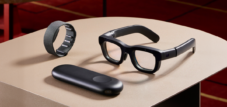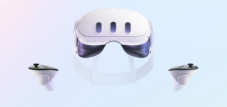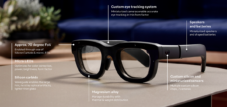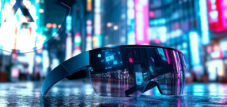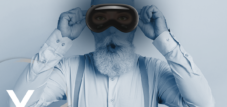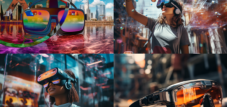Smart glasses: Secret matter “Project Atlas” – Is Apple planning a major attack on the augmented reality glasses market?
Xpert pre-release
Language selection 📢
Published on: December 23, 2024 / update from: December 23, 2024 - Author: Konrad Wolfenstein

Smart glasses: Secret matter “Project Atlas” – Is Apple planning a major attack on the augmented reality glasses market? – Creative image: Xpert.Digital
Apple's “Project Atlas”: The development of a new generation of smart glasses
Apple's entry into the world of smart glasses with augmented reality
Apple has apparently launched a new project called “Project Atlas” dedicated to the development of smart glasses and intended to take a closer look at the market for wearable AR technology. This project raises high expectations, as Apple has already proven with products such as the iPhone, the Apple Watch and the AirPods how successful a well-thought-out hardware design with appropriate software integration can be. “Project Atlas” represents a potential expansion of the Apple ecosystem: The goal is to give users a device that fits seamlessly into everyday life and makes information visible right before their eyes. Many people see augmented reality glasses as the future of mobile communication and information processing. However, it remains to be seen whether the project will turn out to be a new revolution in the technology market. Nevertheless, Apple's most recent activities show that the company is specifically collecting feedback and putting together initial focus groups in order to understand as early as possible how smart glasses could be designed and used in the future.
Internal feedback and research approach
“Project Atlas” is an internal project that has so far only been visible to the outside world to a limited extent. Internal Apple teams are currently collecting feedback from employees on various smart glasses that are already available on the market. These findings should enable Apple to better understand what users value, which functions are particularly relevant and where there are weak points that need to be overcome. It is quite realistic that Apple is not only planning its own product for end consumers, but would first like to find out how this technology can be used and which innovations should accompany a possible market launch. The study is led by the Product Systems Quality Team, positioned within the Hardware Engineering department. This division has already proven its expertise with previous Apple devices by paying attention to quality and reliability.
Speculation about possible properties of Apple glasses
Interestingly, there is already plenty of speculation about possible features of future Apple glasses. Many observers suspect some kind of “improved AirPods concept”. The AirPods are emblematic of Apple's ability to impress with minimalist design and a high level of functionality. Glasses that could be viewed as a further development of the AirPods would focus even more on the topic of audio. At least the shape of the glasses allows more space for sensors and a larger battery. This could result in a device that reaches a new level in terms of audio technology, battery life and wearing comfort. “An integrated voice assistant” would be conceivable: Siri could sit directly in the temples of the glasses and would respond to calls. This offers the advantage that additional headphones are not required to listen to music or answer calls.
Integration into the Apple ecosystem
In addition, close integration into the Apple ecosystem can be expected. Many people who already own an iPhone might see smart glasses as an addition, similar to the Apple Watch. Users are familiar with the smooth interaction of Apple products, be it Airdrop functions or the simple synchronization of data via iCloud. “With Apple glasses, a seamless connection to the iPhone or Apple Watch would be almost certain,” say some industry experts. This integration could not only facilitate data exchange, but also access to notifications, calendar events or health data.
Advanced sensor technology and camera functions
Another big topic in the AR area is sensors and camera functions. Apple already uses advanced cameras and sensors in iPhones and iPads that enable impressive photos, videos and AR applications. Glasses could further refine this approach, for example by supporting high-quality photography or using additional sensors to detect the environment. This would be an advantage if users want to have information displayed directly in their field of vision. Especially when it comes to navigation, the glasses could indicate the direction on site, measuring distances and recognizing objects in real time. The interaction of AR, camera and sensors promises to enrich everyday life - be it by displaying relevant information, suitable routes or interactive experiences with the environment.
Battery life and energy efficiency challenges
The issue of battery life is also important for all smart glasses. “Project Atlas” could benefit from Apple’s years of experience in energy efficiency. A larger form factor than AirPods would have room for a more powerful battery, which could have a positive impact on usage time and performance. At the same time, the question arises as to how Apple can manage to design the components so efficiently that they are not too heavy and still provide enough energy. After all, Apple is considered a pioneer in the development of processors and chips that are specifically tailored to its own hardware and software network. Energy-efficient glasses could benefit enormously from this know-how.
Stylish design as a decisive success factor
An important point with such devices is always the design. Apple is known for its minimalist aesthetic that feels both functional and premium. However, when it comes to glasses, the issue of style is even more important because they are worn on the face and are therefore a fashion statement. The challenge is to find a balance between functionality, comfort and visual appeal. “Apple could base its design on popular glasses shapes such as Ray-Ban models,” say some insiders. This would ensure that potential customers not only feel like technology enthusiasts but also enjoy a fashion aspect. At the same time, one can assume that Apple will try to design the product as light as possible so that it can be worn for long periods of time without causing problems.
Additions to Apple's VR and AR strategy
At the same time, “Project Atlas” is not Apple’s only project in the area of AR and VR technology. With the Vision Pro, the company has already announced a mixed reality headset, which is, however, in the high-priced segment and could appeal to a more professional audience with its wealth of functions. The idea of additional, lighter glasses aimed at everyday use would therefore be a logical addition. While the Vision Pro is intended to offer an immersive experience, Project Atlas could focus more on everyday usability by providing notifications, navigation and simple AR overlays without being too big or too expensive.
Competition in the smart glasses market
Looking at the smart glasses market, Apple is potentially competing with companies like Meta and Google. Meta has already made several attempts to gain a foothold in this area by cooperating with well-known eyewear manufacturers and developing its own headsets. Google, in turn, brought Google Glass, an early, albeit controversial, version of data glasses onto the market and was able to gain initial experience. But none of these companies enjoys such a strong reputation for user-friendliness and design as Apple. This in turn opens up the opportunity to stand out and advance a new generation of AR glasses. “Apple could focus on local data processing and greater privacy,” analysts suspect, as the company is known for protecting customer data in the best possible way.
The Global Smart Glasses Market: A Growing Opportunity for Innovation
The global smart glasses market is expected to grow rapidly, with estimates of billions in sales in the coming years. This creates an area of tension: on the one hand there is great potential, on the other hand the expectations are high. A company like Apple cannot afford to release an immature product. It is therefore likely that Project Atlas will take a deliberate, strategic course to closely align with the wants and needs of the market. Technical deficiencies or overly complicated handling would quickly turn into criticism and damage the image that Apple has cultivated for decades.
Added value through augmented reality: new possibilities in everyday life
A significant success factor will be whether Apple actually manages to offer users added value that goes beyond pure gimmicks. Especially in the area of AR applications, many hope for real benefits in everyday life: “Imagine you are walking through a foreign city and the glasses show you in real time where interesting places, restaurants or shops are,” they say some visions. Or let's think about the fitness sector, in which Apple is already active: the glasses could provide information about your own posture, show training progress or provide supportive information while jogging. All of this could be projected directly into the field of vision without having to also look at the smartphone.
Intuitive operation as a key feature
There could also be exciting approaches to operation. In addition to Siri, intuitive gesture control could be imagined, for example, in which hand movements or head tilts serve as an input method. However, this technology would have to work very precisely in order not to be perceived as disruptive. Apple has proven itself to be a master of fine-tuning in the past and could prove once again how important a well-thought-out user experience is. “Project Atlas” would therefore be an example of Apple's claim to not only enter new device classes, but also to significantly shape them.
Different approaches: Apple against the competition
The potential differences to the smart glasses from Meta and Google are particularly interesting. With its Ray-Ban Stories, Meta has brought a lifestyle product onto the market, but largely does without an AR display. Google's glasses, on the other hand, featured a small prism that could display information in the field of vision, but were primarily relevant to business customers and professionals. Apple could choose a middle ground here: on the one hand, a fashionable design that is suitable for everyday use, and on the other hand, a clever AR display that offers real added value. It is also expected that Apple will integrate Siri directly into the glasses, while Meta is relying on “Hey Meta” for its product. Apple could also implement advanced solutions when it comes to cameras, like those already used in iPhones.
Privacy and security: A key aspect
Data security and privacy protection are also among the topics where Apple could score points. The company will likely be careful to defuse potential criticism from the start, for example by clearly labeling when a camera is active or by setting strict guidelines for applications that access the glasses' features. It can be assumed that Apple places a similarly high priority on protecting personal data as it does with its other products. This approach would increase customer trust and pave the way for acceptance of new camera-equipped devices.
Challenges and opportunities: Apple's premium claim
Looking at the challenges and opportunities, one can summarize that Apple must develop a product that stands out clearly enough from existing models in order to meet its own premium standards. “Project Atlas” appears to be just one of the company’s many initiatives, but it underlines Apple’s commitment to AR headsets and glasses. Drawing on the expertise Apple has gained through the development of the Vision Pro and other devices, it could work toward a solution that is slimmer, lighter, and less noticeable. Anyone who uses glasses every day will attach great importance to wearing comfort. In addition, the operation must be intuitive and the technology must function reliably.
“Project Atlas” as a promising milestone
In the end, “Project Atlas” represents an exciting opportunity for Apple to redefine the relatively young smart glasses market. If the product actually appears, it will probably appeal not only to fans of the Apple brand, but also to those who are looking for sophisticated AR glasses that can be integrated into everyday life without appearing bulky or complicated. The potential is enormous: navigation, news, fitness tracking, entertainment and much more could fit more naturally into daily life. However, Apple must walk the fine line between innovation, data protection, design and user-friendliness, which it has often navigated safely in the past.
“Project Atlas” symbolizes a phase of intensive exploration: Apple is thoroughly examining which functions are useful and practical for possible market readiness. Although the rumor mill is already in full swing, it is not unlikely that the project will undergo several changes before a final product sees the light of day. If Apple ends up introducing glasses that are both light and stylish as well as technically advanced, “Project Atlas” could actually be a milestone – not just for Apple, but for the entire industry. Until then, however, the tech world remains excited and waits to see what specific details Apple will officially reveal at some point. One thing is certain: “Project Atlas” suggests that Apple’s commitment to AR technologies is far from reaching its end. Rather, the company seems ready to consistently continue its course of innovation and expand its product range with another, possibly revolutionary device.
🎯🎯🎯 Benefit from Xpert.Digital's extensive, fivefold expertise in a comprehensive service package | R&D, XR, PR & SEM

AI & XR 3D Rendering Machine: Fivefold expertise from Xpert.Digital in a comprehensive service package, R&D XR, PR & SEM - Image: Xpert.Digital
Xpert.Digital has in-depth knowledge of various industries. This allows us to develop tailor-made strategies that are tailored precisely to the requirements and challenges of your specific market segment. By continually analyzing market trends and following industry developments, we can act with foresight and offer innovative solutions. Through the combination of experience and knowledge, we generate added value and give our customers a decisive competitive advantage.
More about it here:
We are there for you - advice - planning - implementation - project management
☑️ SME support in strategy, consulting, planning and implementation
☑️ Creation or realignment of the digital strategy and digitalization
☑️ Expansion and optimization of international sales processes
☑️ Global & Digital B2B trading platforms
☑️ Pioneer Business Development
I would be happy to serve as your personal advisor.
You can contact me by filling out the contact form below or simply call me on +49 89 89 674 804 (Munich) .
I'm looking forward to our joint project.
Xpert.Digital - Konrad Wolfenstein
Xpert.Digital is a hub for industry with a focus on digitalization, mechanical engineering, logistics/intralogistics and photovoltaics.
With our 360° business development solution, we support well-known companies from new business to after sales.
Market intelligence, smarketing, marketing automation, content development, PR, mail campaigns, personalized social media and lead nurturing are part of our digital tools.
You can find out more at: www.xpert.digital - www.xpert.solar - www.xpert.plus








